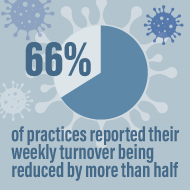
RCVS survey reveals impact of COVID-19 on clinical practices
More than 60 per cent of practices have seen their weekly turnover fall by more than half during the COVID-19 pandemic, a survey by the RCVS has found.
Many vets, veterinary nurses and other support staff have also been furloughed, with the aim of signing them up to the Government's Coronavirus Job Retention Scheme, said the College.
Findings from the RCVS survey on the economic impact of COVID-19 provide a snapshot of the impact of the coronavirus crisis on clinical practices.
A total of 532 UK veterinary practices responded to the survey, which ran from 3-7 April. The findings will be used to help the RCVS shape the College’s ongoing response to the crisis, including its discussions with the government.
“I would like to thank all those practices who took the time in what is already a very fraught situation to respond to our survey and provide the evidence we need to gain a holistic picture of coronavirus’ impact on the business and economics of veterinary practices,” commented Lizzie Lockett, RCVS chief executive.
“We plan to continue running these surveys on a regular basis in order to gauge impact over time and the findings will feed into our policy and decision-making. This ongoing research will also be a vital tool when we are talking to Government and other bodies about the impact of policy on the veterinary sector.”
Some 30 per cent of practices reported being impacted by veterinary surgeons and veterinary nurses self-isolating/or with COVID-19, while almost 35 per cent have ‘other support staff’ self-isolating.
The majority of respondents (97 per cent) reported limiting the service they provide to emergencies or emergencies and urgent cases (as per RCVS guidance at the time).
But it is not all bad news. Only a handful (six per cent) of practices that responded to the survey had made or had immediate plans to make staff redundant. Many practices also reported using remote consulting to meet the government's recommended guidelines on social distancing.
A further 14 per cent of respondents said they had donated Personal Protective Equipment (PPE) to the National Health Service for use by those tackling the pandemic on the frontline.
The next practice impact survey is planned for early May.



 The latest
The latest